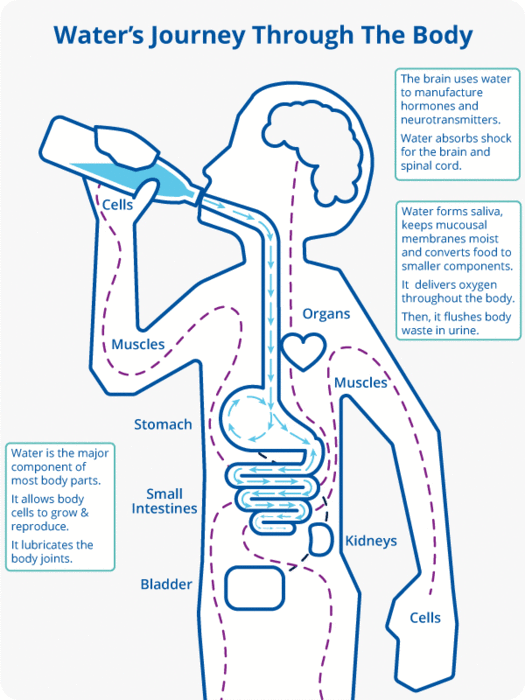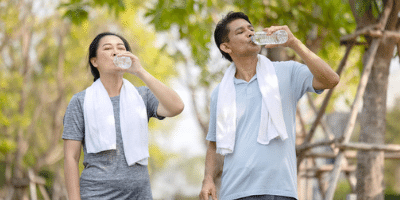How to optimize water absorption for the body?
You've taken a sip of water - what happens next? Where does it go?

Table of Contents

You've taken a sip of water - what happens next? Where does it go?
Water is the foundation that all known life is built upon. From the most basic cells to the most complex animals, nothing that we know of can survive without it. Water serves a massive variety of essential functions, from helping us absorb nutrients to regulating body temperature. So, what exactly happens when you drink water, and where does it go when you drink it?
In this article, we will explain water’s journey through the human body including the water digestion process and why water is so crucial to our survival and health.
The moment water leaves your mouth it has a journey to make.
When you drink water, it travels through your body in a quick but complex process as it has many more roles than just quenching your thirst. By hydrating well, your body can perform at its best. Water’s journey begins when it’s ingested through the mouth.
The first big step in the process is the body registering hydration. After a few gulps of water, the brain will generally convince the body — prematurely – that the body has had enough to drink. This is an important hydration mechanism because it takes a long time for the water consumed to reach cells and provide them with sufficient hydration. If the brain registered hydration only after cells received water, people would be drinking way more than the body really needs. The communication between the brain and mouth directs people to stop drinking, even if the water hasn’t fully hydrated the system yet.
After you drink water, here’s where it goes:
1. The esophagus (a small pipe connected to the mouth)
2. The stomach
3. The small and large intestine
5. Blood
6. The liver
7. The heart
8. Blood again
9. Cells
10. Blood again
11. The kidneys
12. The bladder
13. The urinary tract
And finally, water is excreted from the human body.
How does water leave your body?
Once the body utilizes all of the water it needs to function efficiently, it then begins the process of removing excess water. Water leaves the body in four main ways:
1. Through urination
Kidneys use water to filter toxins out of the body, but when the kidney has used as much as it needs; it gets rid of the rest through urine. Your hydration level determines how quickly your body will send water to your kidneys, which then goes to the bladder once it gets processed as urine. If you’re very hydrated, your body will send the excess water into the kidneys quickly because it’s not needed elsewhere. If you’re dehydrated, the water will be absorbed and sent to maintain vital functions before it eventually reaches the kidneys to remove toxins.
2. Through stool
Healthy fecal matter consists of 75% water and 25% solid matter. Once the small intestine has absorbed enough water to send throughout the body, it will pass the water along to the large intestine. When water reaches the large intestine, it will combine with solid matter to soften stool and aid digestion.
3. Through sweating
Sweat is a natural way the body regulates its temperature. It’s estimated that most individuals sweat at a rate of 500 to 700 mL per day, but people can sweat at a rate of up to one liter per hour during high-intensity exercise in a hot environment. While drinking water during exercise will help replace these fluids, the best strategy is to continuously drink water throughout the day to ensure adequate hydration.

4. Through breathing
The majority of the water you drink is absorbed into your bloodstream. Absorption occurs after water passes through the stomach and into the small intestine. The small intestine, at around 20 feet long, is the organ primarily responsible for water absorption through its walls and into the bloodstream. From here, water will travel to cells across the body, providing them with the hydration to perform daily functions efficiently.
The large intestine also absorbs some water to support digestion. A lot of people wonder how long water takes to digest but the thing is, water isn’t technically digested - it’s absorbed. However, it’s a crucial element for digestion, especially when digesting protein. Water should always be consumed with meals so that your body can properly digest and absorb the nutrients from food. Properly filtered water is ideal because it does not contain harmful chemicals and contaminants that can upset the digestive process. Fortunately, several types of water filters exist now for healthier and safer drinking water.
Is there a difference between gulping water and sipping water?
First, chugging water will fill up your stomach faster and cause the nerve receptors in your stomach to give the “I’m full” signal to your brain. Next, drinking water too quickly means you could upset your body’s electrolyte balance.
Ultimately, sipping it slowly throughout the day allows you to absorb the water at a slower pace, and is better for your body. This is the optimal way to hydrate your body.
Pure water is naturally absorbed more quickly than other liquids.
Why is this? Because your body doesn’t need to convert it to anything else. Liquids that have carbohydrates (think sugar), fats, proteins, and colouring, take longer for your body to absorb. The more complex the fluid, the more your body has to break it down before it can turn its attention to the water in the drink or meal, such as a smoothie or a bowl of soup.
Compare cold drinks and hot drinks
In some cases, it’s simply a matter of preference, but in terms of optimizing your hydration, science does have an opinion. First, cold water to an athlete seems to cool them down faster. The body registers cold water intake more efficiently.
Next, the addition of ice also helps you burn more calories. For every ounce of ice your body consumes, it takes five calories to melt it and bring the liquid up to body temperature. Cold water also empties more quickly out of your stomach compared to warm or hot water and therefore is absorbed faster by the rest of your body.
That said, while drinking warm or hot water won’t optimize your hydration, it will help with trips to the bathroom. Hot drinks also seem to help with mental health. As Sheldon Cooper has often noted in The Big Bang Theory, when someone is upset, it’s customary to offer them a hot beverage.
2 notes to take-away:
First, sip your water consistently throughout the day
Second, start your day with a cup of pure water after wake-up
Sources of reference:





![[retreat design] 1 day Saigon staycation](/content/images/size/w1460/format/webp/2024/10/old-books-wooden-chair-high-angle.jpg)